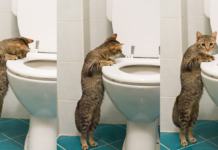If you’re a cat owner, you’re probably familiar with the unpleasant experience of finding hairballs around your home. Hairballs are an unfortunate side effect of your cat’s grooming habits, but they can also be a sign of underlying health issues. In this article, we’ll explore what hairballs are, why cats get them, and how to help your cat deal with them.
Table of Contents
- What Are Hairballs?
- Why Do Cats Get Hairballs?
- Signs That Your Cat Has Hairballs
- How to Help Your Cat Deal with Hairballs
- Regular Brushing
- Increase Water Intake
- Feed a Hairball-Prevention Diet
- Provide Fiber Supplements
- Offer Hairball Remedies
- Consider Medical Intervention
- Preventing Hairballs in Cats
- Conclusion
- FAQs
1. What Are Hairballs?
Hairballs are wads of fur that accumulate in your cat’s stomach and are then regurgitated. They’re formed when your cat grooms themselves and ingests hair. The hair typically passes through the digestive system without issue, but sometimes it can’t make it through and instead forms into a hairball.
2. Why Do Cats Get Hairballs?
Cats get hairballs because they groom themselves by licking their fur. When they do this, loose fur can be ingested, and it eventually forms into a hairball. This is a natural process, and many cats can handle hairballs without issue. However, some cats are more susceptible to hairballs, and they can be a sign of underlying health issues.
3. Signs That Your Cat Has Hairballs
If your cat has hairballs, you’ll likely find them around your home. They can look like small, dark, cylindrical masses, and they can have a foul smell. Other signs that your cat may have hairballs include:
- Frequent coughing or gagging
- Lack of appetite
- Lethargy
- Constipation
If your cat displays any of these symptoms, it’s important to seek veterinary care.

4. How to Help Your Cat Deal with Hairballs
While hairballs are a normal part of being a cat, there are several ways you can help your cat deal with them.
Regular Brushing
One of the best ways to prevent hairballs is to regularly brush your cat. This can help remove loose fur before your cat has a chance to ingest it.
Increase Water Intake
Another way to help prevent hairballs is to increase your cat’s water intake. This can be done by offering wet food, adding water to dry food, or providing a water fountain.
Feed a Hairball-Prevention Diet
Some cat food brands offer hairball-prevention diets. These diets typically contain higher levels of fiber, which can help move hair through your cat’s digestive system.
Provide Fiber Supplements
If your cat doesn’t like hairball-prevention diets, you can try providing fiber supplements. These can be found in the form of treats or powders.
Offer Hairball Remedies
There are several hairball remedies available, such as laxatives or petroleum-based products. These can help lubricate your cat’s digestive system, making it easier for hair to pass through.
Consider Medical Intervention
If your cat is experiencing chronic hairballs or other health issues, your vet may recommend medical intervention. This can include prescription diets, medications, or surgery.
5. Preventing Hairballs in Cats

While you can’t completely prevent hairballs, there are several steps you can take to reduce the likelihood of them occurring. These include:
- Regular brushing
- Feeding a high-quality diet that promotes healthy skin and fur
- Providing plenty of water to encourage digestion
- Keeping your cat active to stimulate bowel movements
- Using hairball prevention products, such as supplements or remedies
6. Conclusion
- Hairballs are a common issue for cats, but they can be managed with proper care and attention. Regular grooming, proper nutrition, and plenty of water can all help prevent hairballs from forming in the first place. If your cat does develop hairballs, there are several remedies available, and your vet can help determine the best course of action.
7. FAQs
- Are hairballs dangerous for cats?
- While hairballs are generally harmless, they can occasionally cause blockages in your cat’s digestive system. If your cat is experiencing frequent hairballs or other digestive issues, it’s important to seek veterinary care.
- How often should I brush my cat?
- This depends on your cat’s coat type and length, but most cats benefit from daily brushing. Short-haired cats may require less frequent brushing than long-haired cats.
- Can I give my cat hairball remedies without consulting a vet?
- While hairball remedies are generally safe, it’s important to consult with your vet before giving your cat any new medication or supplement.
- Can hairballs be prevented entirely?
- While you can take steps to reduce the likelihood of hairballs, it’s unlikely that you’ll be able to prevent them entirely. Regular grooming and proper nutrition can help, but some cats are simply more prone to hairballs than others.
- Are there any breeds of cats that are more prone to hairballs?
- While any cat can develop hairballs, long-haired breeds such as Persians and Maine Coons are more prone to them.



